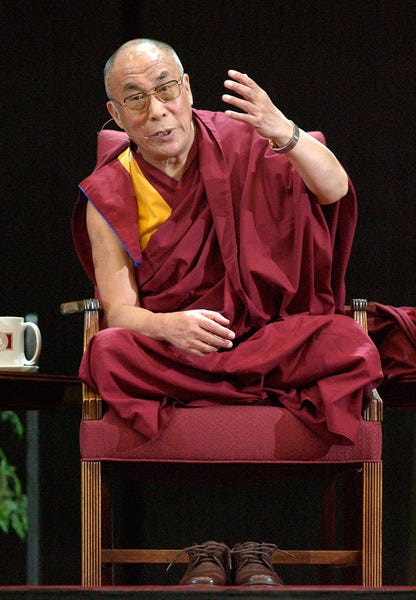"Resolution, resolution! Persist to the end!"
A long-ago meeting with the Dalai Lama – and he was on fire!
Photo: L.A. Cicero
I wrote about covering the Dalai Lama during his 2010 Stanford visit here. But there was a smaller event that wasn’t on the official schedule, and I was lucky to get an invite.
For the previous days, the Tibetan leader had been the jovial figure everyone recognizes, benevolent and happy, but to me he seemed to be holding his fire. In the private session off-campus, he turned into a different man. His message was for Tibet, but for all of us, too: "Resolution, resolution – persist to the end!" he said.
At the private, late-afternoon gathering at the Stanford Park Hotel, he spoke to nearly a hundred Chinese university students from Stanford and Berkeley, as well as faculty, artists and a dozen Tibetan students from around the Bay Area. He emphasized that the Chinese students had not been hearing the truth about Tibet, and he urged them to listen. At the private gathering, the Dalai Lama constantly stressed the importance of dialogue in resolving conflict – hence, the meeting. He meant what he said. And he was electric.
The private event was organized by Tenzin Seldon, then-president of Stanford Friends of Tibet and Stanford’s first student from Dharamsala, where the spiritual leader’s government-in-exile is based. Watching the Chinese students gathered in the courtyard, she observed: "These are the change-makers of the future."
The Dalai Lama aimed to have a frank discussion about the issues dividing the two peoples, which he called “man-made problems." He said he understood why the Chinese people’s were "a little cautious" and afraid of informers. "Many people are facing death sentences because of no free press, no independent judiciary."
However, he added, "our Chinese brothers and sisters have a right to know the reality. 1.3 billion people have the ability to judge what is right and what is wrong. Censorship is immoral and self-destructive."
The Dalai Lama, who seemed newly energized after an exhausting day of public events, spoke in defense of the Chinese people, at one point calling himself a "Buddhist monk Marxist."
"Naturally they love their own nation, naturally they love their own country. So the government creates the impression that the Tibetans are anti-Chinese. We admire the Chinese people," he said. Yet he added a note of criticism: "that great nation should take a more constructive role on the planet."
He took a several questions, including one from a Beijing woman who spoke of the "uneasiness" in today’s China. Perhaps the most moving query was by Zheng Fang, a wheelchair-bound young man who lost both his legs when he was crushed by tanks in Tiananmen Square. In a Chinese exchange that evoked applause and laughter, he asked the Tibetan leader where he anticipated meeting this year’s imprisoned Nobel peace prizewinner, the writer Liu Xiaobo. Tibet’s Nobel peace laureate answered, to more laughter, that it was hard to anticipate the future, but the likeliest spot was Beijing.
His advice to those fighting for more freedom in China showed less levity and more steel: "Resolution, resolution – persist to the end!"



@drstansteindl
Another fascinating character from your journalistic life of getting to know fascinating characters!